A HISTORIAN REMINICES A HISTORY MAKER
Share
DIL BAHRA: “I first met Balbir Singh Senior at the Champions Trophy in Amstelveen, Netherlands in 1982. I was with a group who had earlier gone to the Bombay World Cup in that year. Whilst we sat down in the lounge after the match, having our drinks, Balbir, who was the coach of the Indian team at that tournament, was passing through the lounge on his way out. He noticed our group and came over to talk to us”.
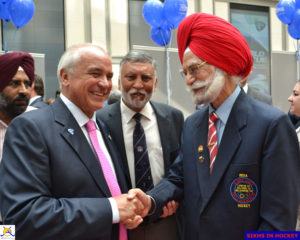
Leandro Negre, Dil Bahra and Balbir Sr. at a FIH function during 2012 London 2012 Olympics
Four years later, we had the Hockey World Cup in Willesden, London. I was one of the members of Phil Appleyard’s organising committee and was delighted to hear that Balbir Singh was invited as a guest at the World Cup. Balbir attended every day without fail and was always seated in the VIP area of the main stand. Phil Appleyard had asked me to personally look after Balbir. Phil Appleyard made a point of greeting him personally everyday as well. It was during this period that I really became to know Balbir as a person. It is here that I learnt that he was a Police Officer in Punjab in his early days. As I was a Police Officer, I made this fact known to my colleagues who were on duty at the stadium and he was greeted by them every day after that. He presented me with his book, The Golden Hat Trick, which he signed (dated 10.10.1986). He used to travel from Hounslow to Willesden by public transport. He met several hockey supporters in the Centenary Club Lounge after the day’s matches and also attended The Khalsa Centre Tooting with my wife Pami and me. The congregation which included hockey players, old and young were delighted and he was invited to speak to the congregation. He was an excellent speaker, both in English and Punjabi. He was quick to notice that most of the people in the congregation were from East Africa and told them how proud he was of their achievements and how he followed hockey in East Africa.
After the World Cup in London I kept in contact with him, occasionally meeting him during his stopovers in London.

Balbir Senior and Dil Bahra in Trafalgar Square – April 2005
In January 2005, when London was bidding to host the 2012 Olympic Games, I was invited to be a member of the ‘Vaisakhi in London Steering Group’ and given the task of identifying all Sikh Olympians living in the UK to celebrate their achievements and to support London’s bid to host the 2012 Olympics. As a result of my extensive research, with assistance from Patrick Rowley, Bill Colwill OBE and Peter Luck of the Hockey Writers’ Club, I was able to compile a list of all Sikh Olympians and establish that most of the Sikh Olympians living in the UK were hockey players though there were also three wrestlers and a weightlifter. It was our fortune that Balbir Singh would be passing through London to his way to Canada around that time and arrangements were made to include him in our celebrations.
In company with Malkit Singh Sondh, the Ugandan Olympian (Munich 1972), I visited Balbir at his sister’s house in Hounslow and informed him of my proposal. He immediately agreed to be our chief guest and to make a speech at a dinner event for the Olympians and guests at the Indian Gymkhana Club in London.
The invitation list to this invite only function of about 150 people included Patrick Rowley, who was the Chairman of the Hockey Writers’ Club at the time, whilst I was the Secretary. Pat, one of the most senior hockey writers in the world and now honored with a BEM, was also asked to speak at this function. He started his speech by recollecting “My first Olympic Games was in 1948. I was only a schoolboy but I persuaded the sports editor of the local paper, the Middlesex Chronicle, to include some words of a schoolboy’s view of the 1948 Olympics. I could have used all the few words at my disposal on India’s over whelming victory over Britain in the final. I and GB were mesmerised by the Indian centre forward, Balbir Singh. My love of hockey started – that day”. Pat went on to say how much he had admired seeing Balbir play over the years.
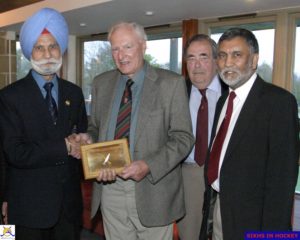
Balbir Sr., Pat Rowley, Bill Colwill and Dil Bahra at Hockey Writers’ Club presentation in April 2005
The Officers of the Hockey Writers’ Club, knowing that Balbir was in London that week, took the opportunity of making him an Honorary Life Member of the Club. As Secretary of the Club I was involved in the process and present at the awards function at Southgate Hockey Club.
The successful dinner event was followed a week later with London seeing the biggest ever gathering of Sikh Olympians in Trafalgar Square on Sunday 24 April 2005. Balbir was one of the players to grace the occasion. And as we all fondly remember, London did win the bid to host the 2012 Games.
Mike Hamilton, the well-known hockey journalist from New Zealand, who saw a photograph of Balbir and me in a Hockey Writers Club newsletter contacted me to tell me that he remembers Balbir as a young boy when Balbir stayed at their house in the mid-fifties. He asked me to pass on a message to Balbir, which read “my love for the game of hockey all started through my parents and your visit to Christchurch in 1955 as leader of the Indian Wanderers team. Balbir, you were kind enough to give my father, Keith, a pocket patch from a blazer of the team and I have kept it all these years. I am delighted to see you looking so fit and well in the photograph.” I passed this message to Balbir who was obviously delighted and wrote to Mike. Sadly Mike Hamilton passed away in 2011.
As a result of all the information gathered, I decided to research further into the contribution made by Sikhs in hockey all over the world. I had noticed that all records were not recorded. As part of my research, I travelled to the IOC Library in Lausanne and with the assistance of my fellow members of the Hockey Writers’ Club, I had a comprehensive history and record of Sikhs in hockey at the Olympic Games. By the time I went to Chennai for the Champion’s Trophy in December 2005 my records were nearly complete. Two of my good friends, Prabhjot Singh of the Tribune and Pargat Singh, the Hockey Olympian, who were both in Chennai convinced me to visit Punjab in February for the India v Pakistan series. Pargat, who was also a Police Officer and Director of Sports in Punjab at the time, offered to host my visit.
In order to obtain more information, I travelled to Chandigarh in February 2006. I met Balbir, Sushbir, his daughter and his son in law Retired Wing Commander Malvinder Singh Bhomia at the hockey stadium and Balbir invited me to his house for lunch the following day. He also introduced me to Tarlochan Singh Bawa, his teammate at the London 1948 Olympics. Prabhjot had also invited Balbir and me to the Tribune Offices later that evening. I was so pleased to note that at his house Balbir had a framed photo of him and me at Trafalgar Square in 2005.
The series with Pakistan moved to Jalandhar and Balbir Senior put me in contact with Balbir Services who lived in Jalandhar. Balbir Services invited me to his house for breakfast before the hockey match that afternoon. I saw the Jalandhar match with both the Balbir’s and they introduced me to several Sikh Olympians who were at the match.
It was during this period that I truly realised the achievement of Balbir Singh Senior in the hockey field. I consulted him on many occasions, particularly in relation to names and identifying photos from the past. He was always very helpful despite phone calls at all times of the day, bearing in mind that he was either in Canada or India. I had a comprehensive history of all the Sikhs world over who had played hockey at Olympic Games.
Top Sikh Hockey Player of all time.
In April 2006, I was invited by journalist and author, Sundeep Misra to be a member of a select panel to choose “the Top ten Sikh Hockey Stars of all time”. My fellow judges, in New Delhi, were the former Indian Supreme Court Chief Justice J S Verma (Chairman); four-time Olympic Medallist Leslie Claudius; three-time Olympic Medallist Col Haripal Kaushik; two-time Olympic Medallist R S Bhola; Former Sports Editor of The Press Trust of India K Jaganadha Rao; Hockey Writer of The Hindu S Thyagarajan; Hockey Writer of The Tribune Prabhjot Singh and former Indian Hockey Federation President I M Mahajan.
Ashwini Kumar, the former President of the Indian Hockey Federation, was the Chief Guest at a ceremony at The Ashok, New Delhi on 26 April 2006. Ashwini announced Balbir Singh Senior as the top Sikh Hockey Player of all time and the top Ten Sikh hockey stars were all felicitated. Ashwini was able to tell me, first hand, the contribution Balbir had made to hockey and I had an opportunity to cross check a few facts with him.
On his way to Canada, Balbir stopped over in London as he always did. On hearing of his award, The East African hockey players living in London decided to hold an event to honour Balbir for being selected as the top Sikh Hockey Player of all time. The event, organised by Malkit Singh Sondh, at Shalimar Hotel in West London on Sunday 14th May 2006 was attended by over 150 guests, which included over 100 past and present players including several Olympians.
I was invited to be the Master of Ceremonies. Balbir Singh in his speech recalled the fond memories he had of London and shared his stories of the 1948 Games. Whilst making a presentation to Balbir Singh on behalf of the Sikh hockey players, Malkit said how proud he was to make the presentation to a hockey legend who was a role model to so many players throughout the world. He was given a truly remarkable, honourable applause. Palwan Singh, a former Indian International wrestler, who fought under the name Prince Mann Singh, recalled how as a youngster he had to queue in New Zealand in the fifties to have a glimpse of the great Balbir Singh.
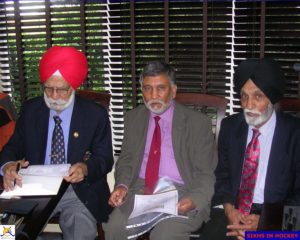
Balbir Senior, Dil Bahra and Gurdev Singh Kullar in 2007
I retired from the Police Service in January 2007 after 32 years and on retirement I set up my Sikh Hockey Olympians website, as I was now able to dedicate more time to hockey history. Balbir’s ten days visit to London that summer was a memorable one. He was accompanied by a film crew and I was requested to co-ordinate the trip. It included filming at Milton Keynes Hockey Stadium, Wembley Stadium where we were granted entrance to the stadium although it had been rebuilt since the London 1948 Olympic Games, Park Royal where he had scored 6 goals against Argentina, a trip to Buckingham Palace to watch the Guard Change from the Palace Forecourt.
There was also a trip to Northants on 2nd July 2007, where a reception had been arranged by Midlands sporting fans in honour of Balbir and his sporting achievements. Gurdev Singh Kullar, who was Balbir’s team mate at Melbourne 1956 Olympic Games, Punjab Police and Punjab, was also invited and I had the pleasure of being the Master of Ceremonies at this event and inform the audiences of the achievement of these two hockey greats. This also gave me a unique opportunity of hearing the experiences of these two great players first-hand. They talked about the good old days and I was privileged to listen to these stories.
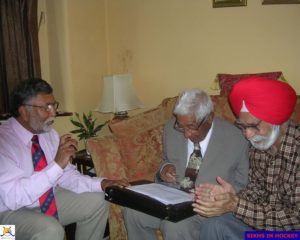
Dil Bahra, Joe Gallibardy and Balbir Senior in 2007
Two days later we met Berlin 1936 Indian Gold Medallist, Joe Gallibardy, at his house in East London. Joe recalled his experiences at the Berlin Games and also checked my records together with Balbir. Hearing the two discuss their training and playing days and the sacrifices they had to make, was a real privilege and to see the mutual respect they had for each other.
His ten days visit concluded with a gathering of his supporters and friends at Indian Gymkhana Club, London.
In August 2008, Balbir wrote to me saying “Your web “sikhhockeyolympians.com” is one more encyclopaedia by you on internet. The first was on paper. I have been reading it frequently. I read the details regarding the 1936 Berlin final. Information printed by you is correct. The facts recorded by FIH on their website are incorrect. Can you do anything about this?”, he asked. I promised him that I would do all I could.
Delhi World Cup 2010
I attended the Delhi World Cup as the Media overseer for AIPS Hockey Commission and the FIH. Pat Rowley and I were hosted by journalist Sandeep Nakai at his residence. I had informed Balbir that I would be attending the World Cup. As happens during such major events, invitations to many functions are received and one of these invitations through Sandeep was to “A Salute to Indian Hockey”, organised by Sunil Yash Kalra. Pat and I attended this event with Sandeep with the intention of staying only for half an hour. On reaching the venue hall, I was asked to go out as the Guest speaker wished to see me. I then found out that Balbir Singh Senior and K P S Gill were the Chief Guests. I accompanied Balbir to the hall and after the speeches he came and sat down with Pat, Sandeep and me for dinner and the whole event from there on revolved around our table – the photographs and the autographs of him etc.
A couple of days later, Sunil arranged for a recording of a discussion about Indian hockey between Balbir Singh, KPS Gill and me at K P S Gill’s residence.
I met Balbir on a daily basis at the hockey stadium and we had a long pre-arranged meeting about the inaccurate FIH records with Leandro Negre, President of the International Hockey Federation, whom I knew very well from my appointments as the FIH Media Officer and Secretary of The Hockey Writers’ Club. Leandro, an Olympian himself, took personal responsibility of getting the FIH records checked and corrected.
Leandro Negre, true to his words, ensured that the error was rectified and that the correct results were recorded by the FIH. Balbir was informed personally of this by letter with a copy to me.
The FIH, in that written correspondence on 24 February 2011, confirmed that “The record of the most goals scored in an Olympic final belongs to India’s Balbir Singh Dosanjh ‘Senior,’ who scored five goals in the 1952 final in Helsinki on 24th July 1952, when India defeated Holland 6 – 1.”
London 2012 Olympics
The Olympic Journey: The story of the Games was a free and unique experience specially created by The Olympic Museum in collaboration with the Royal Opera House and BP, and was part of the London 2012 Festival. It showcased some of the incredible artefacts and images from The Olympic Museum in Lausanne and told the story of the Olympic Games from its creation in 776BC through to the London 2012 Olympic Games.

Balbir Singh Sr and FIH President Leondro Negre at London Olympic turf
The stories of the representative 16 athletes were told through interviews, historic footage, photographs and artefacts. Each story tells of human strength and endeavour, of passion, determination, hard work and achievement and demonstrates the values of the Olympic Movement; respect, excellence and friendship. Balbir Singh was one of the 16 athletes chosen, the only one from India and hockey. I was thrilled that Balbir was one of these athletes chosen.
I acted as the co-ordinator/liaison officer for Balbir and attended the first filming at the Royal Opera House. After this interview, we met Mike Sharrock, Partnership Director, London 2012.
I was one of the founders of the Hockey Museum which had been set up a year before and as the webmaster at the time and after the interview I wrote an article on the Museum website: “Hockey at the Royal Opera House”.
The Royal Opera House and BP had joined forces with The Olympic Museum in Lausanne to create a unique exhibition telling the Olympic story through the endeavours of ancient and modern Olympians. Hockey was represented in the Olympic story by the experiences of Balbir Singh ‘Senior’, the triple Olympic gold medallist, who is one of 16 iconic Olympians featured in this free exhibition.
Mike Sharrock wrote to me that evening: “It was a real pleasure to meet the Great Balbir Singh this afternoon and to hear his wonderful story first-hand. We are all very proud to be able to include him as one of the 16 athletes whose stories will be featured in the exhibition during the Olympics. The special historical significance of independent India winning its first gold medal against Great Britain will be especially interesting for visitors to the exhibition in London. I look forward to the opportunity to show you and Mr Singh around the exhibition in a few weeks’ time”.
I visited the exhibition three times with Balbir and Mike Sharrock always made it a point to personally see us despite his busy schedule. I also accompanied Leandro Negre, President of International Hockey Federation to this exhibition.
David Christison, a FIH colleague and Hockey Writers Club member based in Australia read the story on the Museum website and wrote to me saying he had tweeted my museum piece earlier that morning and received a response from former Australian captain David Wansbrough which I would find amusing. His father, Colin, was long-time president of the Australian Hockey Association.
Colin, aged 76 (in 2012), who was Vice President and Treasurer of the Australian Hockey Association from 1984 to 1993 wrote: “You may find this hard to believe, but I actually played against Balbir Singh in a practice match between my club Camberwell and India prior to the 1956 Melbourne Olympics. I took the day off work, illegally, to play at Elsternwick Park and they beat us 13-0. I was centre half and Balbir led the Indian attack. He scored eight goals. The Indian goalkeeper played for us in the second half. Balbir presented me with his stick after the game. How good was that?
That night the Camberwell team were the guests of the Indian team for dinner at the Olympic Village in Heidelberg. This was my first very hot curry. Charlie Morley organised it and Mike Craig, Ric Purser, Bill Horman, Ron Legg, Al C, etc. all played. The next day there was a photo of Balbir and I in a newspaper. I was unaware of that and got caught out as I was supposedly at my grandma’s funeral.”
When I told Balbir this story he replied: “You have shown me some interesting information about me. No wonder you are an encyclopaedia in more than one aspects of hockey. I wonder how you have so much information about hockey”
Prior to the Olympic Games, I was present with Balbir during his interviews at BBC World Service in White City, BBC at the Olympic Park, “Words of Olympians Patrimonial Collection of Filmed interviews of Olympic Athletes project of the Olympic Museum”, and several other interviews. I also arranged a visit for him at The Hockey Museum where he met John Peake, the Great Britain Olympian who played against him at the London 1948 Olympic Final.
Balbir was invited to the FIH Lunch at Grange Hotel, St Pauls during the Olympic Games to which I had also been invited. Leandro Negre ensured that Balbir was well looked after.
Leandro Negre and Balbir Senior walking on the pitch during half time at London 2012 Olympics
One of Balbir’s highlight of the London 2012 Olympic Games was when Leandro Negro accompanied him to the pitch at half time during a match for him to be interviewed live on TV. He received a fantastic ovation from the crowd.
I kept in contact with Balbir regularly, meeting him on his stopovers in London when he was travelling between India and Canada. Several meeting and interviews were arranged during these visits – like Richard Sayer coming to Balbir to check facts for his book “Master Sportsman – the story of Norman Borrett”. Norman was Great Britain’s captain at London 1948 Olympic Games.
In 2015 when my family were planning a visit to India and he was in Canada, he made sure that Chandigarh was in the itinerary. Unfortunately he was unable to make it to Chandigarh during our visit but never the less we visited his home to the delight of his daughter Sushbir and grandson Kabir.
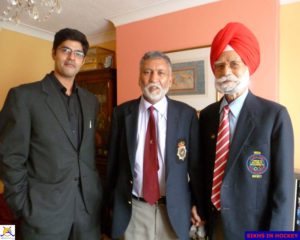
Kabir Bhomia, Dil Bahra and Balbir Senior
I was fortunate that I was able to speak in person with Great Britain Olympian, John Peake who played in the Final of the London 1948 Olympics at Wembley (12 August 1948) where Balbir scored two goals and his team mate also scored one goal at this match, Tarlochan Singh Bawa. And I had the opportunity of talking in person to the late Sir Derrick Day, the Great Britain goalkeeper, about the semi-final match at Helsinki 1952 Olympic Games (20 July 1952) where Balbir scored all the Indian 3 goals. For the Melbourne 1956 Olympics, his team mate Gurdev Singh Kullar, with whom I am still in contact, was able to give me a first-hand account. Mike Craig, the former Australian Captain, who was a commentator during the Melbourne Olympics also shared his wealth of information of the Games with me from his accurate written records.
I last spoke with Balbir via video link on 14 April 2020. It was Vaisakhi day and he wanted to pass on his Vaisakhi greetings personally. We chatted for about half an hour and talked about hockey and our families. He seemed in good spirits as always.
Published with the permission www.sikhsinhockey.com


